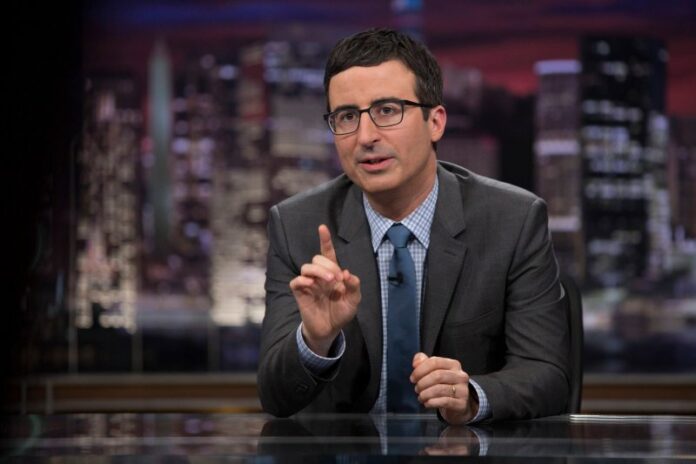HBO talk show host John Oliver uses compassion, sharp wit to engage America on issues we didn’t know we should care about
In the second season of John Oliver’s late night talk show “Last Week Tonight,” he announced that he had officially started his own church: Our Lady of Perpetual Exemption. This entire (legally binding) sketch was written to target televangelists who found mega-churches in order to take in millions while being exempt from paying taxes. Oliver proved what little effort creating an organization like this requires and how easily fraud and corporate greed can take advantage of these platforms.
The way Oliver clearly portrays a very nuanced political problem with humor in just a 20-minute segment has led to what is now known as the “John Oliver Effect.” The term refers to the power of Oliver’s satirical commentary and the lasting effects his messages have on the country.
Before getting his own show, Oliver worked as a senior British correspondent on “The Daily Show with Jon Stewart.” Oliver was praised for his work on the show, winning Primetime Emmy Awards for his writing. He then started filling in for Stewart as host of the series, and the public started getting used to him.
“He has a very inviting way of having us all take a look at issues around us with amusement, with sadness, with irony,” HBO programming president Michael Lombardo said in an interview with the Hollywood Reporter. “But there’s no cynicism or judgment in it. His observations are always really acute and heartfelt.”
This sentiment is what carried Oliver in his career — and eventually into his own series in 2014. Although he originally had a two-year contract, “Last Week Tonight” still airs today. Oliver has become commonplace in households and classrooms alike due to his ability to explain and support his opinions about topics that might otherwise go over the common person’s head, often leading to significant action being taken as well.
The “John Oliver Effect” can be seen in the numerous examples of Oliver affecting change in both legislation and national opinion. In 2015, Oliver tackled the issues of the bail bond system, showing the ways it works as a disservice to the impoverished and keeping innocent people behind bars. Soon after, New York officials made plans to change the bail requirements, and Mayor Bill de Blasio issued a statement addressing the problem just a month after the segment aired.
One of the most significant examples of the “John Oliver Effect” was during the net neutrality debate in 2014. Oliver brought the term “net neutrality” into the cultural zeitgeist by explaining its significance to the common person in an interesting and understandable way. This alone was a feat of his writing, as too often the terms of net neutrality had been explained in intensly mundane and convoluted ways.
“That is the most boring thing I’ve ever seen,” Oliver joked after showing a clip of an interview discussing the net neutrality laws at stake. “I would rather listen to a pair of Dockers tell me about the weird dream it had.”
Oliver used the rest of the segment to explain net neutrality in a way that connected with average people. After explaining its importance, Oliver urged his viewers to flood the Federal Communication Commission with their opinions about the proposed bill. After receiving so many messages at once, the FCC’s website crashed. The FCC eventually voted to adopt net neutrality regulations, and many credit Oliver in making that happen.
The effects of Oliver’s style are palpable, and he might be changing the face of news as we know it. As more people are growing distrustful of news outlets, people are leaning more toward satire.
“There is dissatisfaction with mainstream news media,” said Julia Fox, an associate professor at Indiana University’s Media School in an article in Variety. “More people don’t trust media than do.”
Oliver is intelligent but not pretentious. He explains things that might go above the average person’s head with wit and, most importantly, factual data to back up his claims. There are no gimmicks or ulterior motives — just in-depth analysis under the guise of comedy. Oliver truly seems to be on the side of the masses, which enables more action.
Especially in today’s state of unease, it is hard to know what or who to trust. While Oliver does not gloss over the very real threat the world is currently facing, there is also a comfort in knowing there is someone with a platform who is worthy of being trusted.
“Try your best to tune out and not pass on misinformation in the coming weeks from sources like, sadly, the president.” Oliver said in a recent segment. “And instead, pay attention to trustworthy information from the CDC, experts like Anthony Fauci and, of course, TikTok hamsters. Always TikTok hamsters.”
Written By: Alyssa Ilsey — arts@theaggie.org




